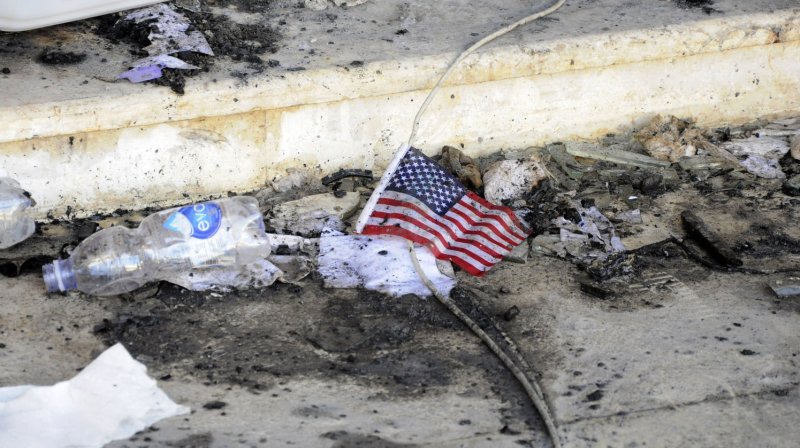1 of 5 | A small American flag is seen in the rubble at the United States consulate, one day after armed men stormed the compound and killed the U.S. Ambassador Christopher Stevens and three others in Benghazi, Libya on September 12, 2012. The gunman were protesting a little known film by an American amateur filmmaker that angered Muslims as it was deemed insulting to the Prophet Mohammad. UPI/Tariq AL-hun |
License Photo
BENGHAZI, Libya, Sept. 12 (UPI) -- The killing of the U.S. envoy to Libya and an abortive August attack in the Sinai desert by suicide bombers seeking to trigger trouble between Israel and Egypt are brutal reminders that Islamist terrorism is far from defeated, as U.S. officials claim.
Libyan officials blame jihadists for killing Ambassador Chris Stevens and three other Americans with rocket-propelled grenades when they visited the riot-battered U.S. consulate in Benghazi, a hard-line Islamist bastion.
American strategists have boasted since the May 2, 2011, assassination of al-Qaida's founder Osama bin Laden in his Pakistani hideaway that the jihadist organization was on the ropes.
This perception, which many U.S., European and Middle Eastern counter-terrorism analysts dispute, has been reinforced by the relentless toll of al-Qaida leaders and their allies killed, largely in aerial drone attacks, in Pakistan's lawless tribal belt over the last five years.
But, says former CIA operative Bruce Riedel, "Al-Qaida today is stronger at the operational level in the Arab world than it's been in years and its prospects for getting stronger are rich."
Riedel, a 30-year CIA veteran and former adviser on the Middle East to four U.S. presidents, cautioned: "Al-Qaida has exploited the Arab Spring to create its largest safe havens and operational bases in more than a decade across the Arab world ... despite bin Laden's death and a lack of mass appeal."
While al-Qaida's vast network in Pakistan, where the jihadists fled after the Americans invaded Afghanistan in October 2011, has been seriously disrupted, the organization has decentralized. It has evolved into regional groups, such as al-Qaida of the Islamic Maghreb in North Africa and al-Qaida in the Arabian Peninsula based in Yemen.
AQIM played a major role in the takeover of northern Mali in recent months, part of the fallout from the Western-backed overthrow of Libyan dictator Moammar Gadhafi in August 2011.
That has given the jihadists what is essentially their own state, however precarious its continued existence. This worries other governments in the region, along with the Europeans who see a new jihadist threat emerging.
The downfall of longtime Egyptian dictator Hosni Mubarak Feb. 11, 2011, in a pro-democracy uprising provided another opening for Islamist militants he had suppressed for decades.
Egypt's vast Sinai Peninsula, cut off from the densely populated Nile Delta by the Suez Canal, descended into lawlessness. This has been exploited by al-Qaida, threatening the historic 1979 peace treaty between Israel and Egypt.
The jihadists, including veterans on the wars in Afghanistan, Pakistan, Iraq and Yemen, have stirred up disgruntled Bedouin tribes, neglected by Cairo since the 1979 treaty under which Israel relinquished the war-won Sinai, and helped arm them.
While there is no hard evidence of formal links between the jihadists and the Bedouin, the two groups are clearly cooperating. The Aug. 5 raid on Israel from southern Sinai, in which 16 Egyptian border guards were killed, was clearly meticulously planned and had an ambitious agenda, the hallmarks of seasoned, battle-hardened jihadists.
They're believed to be based in the Jabal al-Halah mountain in central Sinai.
"The Bedouin call it the Tora Bora of Sinai," said Ehud Yaari, an Israeli analyst with the Washington Institute of Near East Policy, referring to the Tora Bora region in Afghanistan where bin Laden hid after U.S. Special Forces invaded the jihadist sanctuary.
The recent mass release of Egyptian Islamists, imprisoned by the Mubarak regime, by the new Muslim Brotherhood government in Cairo has increased alarm in Israel, as well as some Egyptian circles.
Some of the weapons, plundered from Gadhafi's arsenals by jihadists who helped topple him, were smuggled in from Libya, on Egypt's western border.
Other jihadist groups have proliferated across North Africa, and played a vital role in the Islamist gains in Mali, another region where AQIM teamed up with local tribes.
Yemen's jihadists have tried several times to bomb U.S. airliners and the betting is they'll likely succeed one day.
Since 9/11, there have been several major al-Qaida attacks in Europe, Africa and Asia but no catastrophic assault on the United States.
However, documents seized in bin Laden's hideout indicate that a notorious jihadist commander in Pakistan, the late Ilyas Kashmiri, was plotting to assassinate U.S. President Barack Obama and Lt. Gen. David Petraeus, then the U.S. regional commander and now CIA director.





